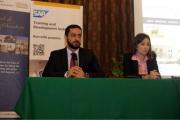|
|
|
|

|
Africa Code Week 2015 to Teach Coding Skills to Thousands of Egyptian Students
Published Oct 8, 2015
|
Thousands of Egyptian youth will learn computer coding skills to boost their career skills and support Egypt’s economic growth, educational institutions and SAP announced today with the launch of Africa Code Week 2015.
Africa Code Week 2015 aims to bring together the continent’s public and private sectors, academia, and NGOs to engage with 20,000 children and youth, and train 1,500 instructors across Africa. By 2025, Africa Code Week aims to train 5 million students and 200,000 educators.
In Egypt, the partnership aims to train at least 3,000 students aged 8-24 in coding skills, with [more than 300] primary, secondary, and university educators each training at least 10 students through innovative online coursework.
Africa Code Week in Egypt is supported by SAP Europe, Middle East, and Africa’s Corporate Social Responsibility team, the SAP Middle East and North Africa Training and Development Institute, and SAP’s University Alliance partners American University in Cairo, Alexandria University, Arab Academy for Science, Technology, and Maritime Transport (AASTMT), and Alexandria Language School.
Mr. Ihab Abdallah Director of Programs & Partnerships department, from the American University in Cairo’s School of Continuing Education, said: “Learning how to code not only boosts digital workforce skills, but helps Egyptian students of all majors to develop problem-solving skills. Supporting Africa Code Week aligns with our goal of encouraging lifelong learning and helping students make a contribution to the Egyptian and international communities.”
Coding skills are in high demand across the Middle East and Africa, and particularly in Egypt, which has made strong digitization progress over the past five years – doubling household fixed broadband penetration, and increasing mobile penetration by five-fold, according to the World Economic Forum.
Africa is the world’s fastest-growing digital consumer market, with 40 percent of businesses planning Big Data projects, and 360 million smartphone users by 2025, according to Africa Code Week.
Dr. Rasha Abdulaziz, Head of Business Information Systems Department, and Associate Professor, College of Management and Technology, AASTMT, said: “Egypt’s organizations struggle to fill ICT careers, which is why we’re prioritizing ICT as a core of our curriculum. Coding skills are at the heart of Egypt’s fast-growing STEM careers, and our support for Africa Code Week provides students with the tools and best practices to share across Africa, the Arab World, and the Middle East.”
However, as countries across the Middle East and Africa pick up the pace in digitization, less than one percent of children in Africa leave school with basic coding skills, according to SAP. Digital jobs could increase individuals’ income in Africa by 40 to 200 percent, according to Africa Code Week.
Dr. Samir Kamal, Dean of the Faculty of Commerce, Alexandria University, said: “Coding skills will be to the 21stcentury workforce, what books in Alexandria’s Library were during the ancient era, with coding skills helping students to boost their knowledge, adapt to different learning environments, gain career skills, and contribute to Egypt’s research and development.”
Dr. Ghada El Khayat, Head of Computers and Information Systems Department, Alexandria University, said: “The parents of yesteryears used to wish that their children could learn 2 or 3 foreign languages to excel in life. Today, the coding language is becoming ever more essential to acquire in the digitalized age we live in, opening doors of opportunities in the contemporary work environment.”
Egypt is well-positioned to advance in the Digital Economy, with Egypt’s National ICT Strategy 2012-2017 aiming to maintain annual ICT growth of 7-10 percent and increasing the sector’s contribution to national income to 5 percent, while boosting e-commerce growth by 20 percent by 2017.
On the job front, Egypt’s National ICT Strategy calls for the country to have at least 115,000 total professionals working in the fields of IT, outsourcing, and innovation and entrepreneurship by 2017.
Amr Ghoneim, Managing Director, SAP North Africa and Levant, said: “Egypt’s Millennials are the first generation born in the mobile device and Internet era, but often lack the digital skills to enter the workforce. Our continued dedication for Africa Code Week strengthens our support for Egypt’s economic and societal growth, and provide young people with the skills to enter the digital workforce.”
SAP has seen strong success in developing the next generation workforce in Egypt, through the organization’s support for the Skills for Africa program for training recent university graduates, and its Training and Development Institute.
The Institute has signed a number of University Alliance Partnerships with leading educational institutions to integrate technology in the curriculum and provide students with real-world experience in the SAP ecosystem of partners and customers.
Marita Mitschein, Senior Vice President for Strategic Investments and Managing Director for the SAP Training and Development Institute in MENA, said: “Youth in Egypt will be able to change how businesses will run in the near future, not just in Egypt but in the wider Middle East. By partnering with Africa Code Week and our University Alliance Partners, we’re continuing our support for Egypt’s growth, and helping youth to develop skills that will be essential in the region’s Digital Economy.”
During Africa Code Week 2015, younger students will learn coding basics on the game-like Scratch platform, while older students will learn how to code on the WhatsApp messaging platform. The country with the highest participation will receive an educational investment through a local partner.
Africa Code Week aims to build on the success of the 2014 event, which involved 38 countries and more than 100,000 participants in becoming digitally fluent in coding skills. For more information, visit www.africacodeweek.org.
Posted by
VMD - [Virtual Marketing Department]
|
|
|

